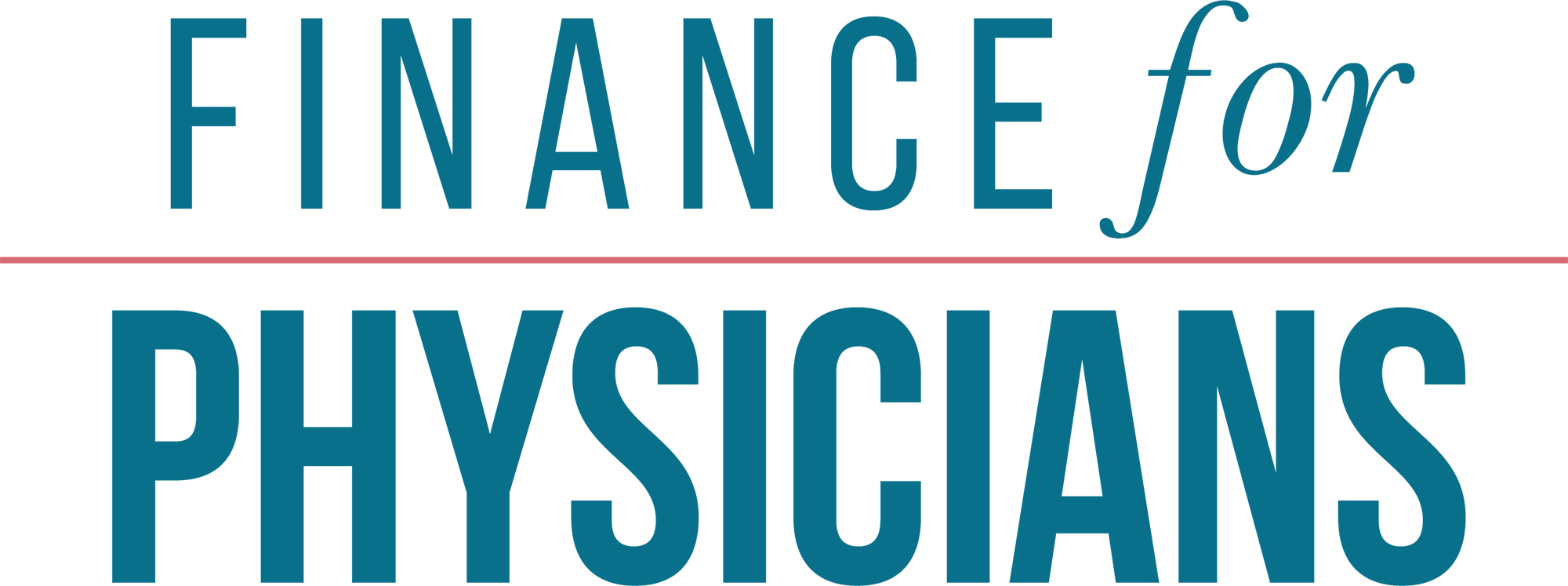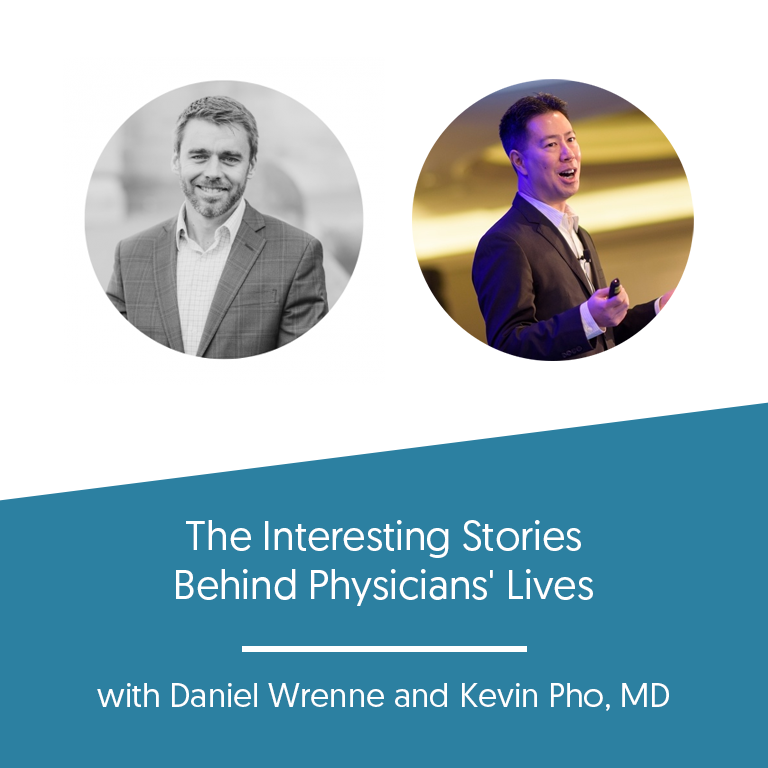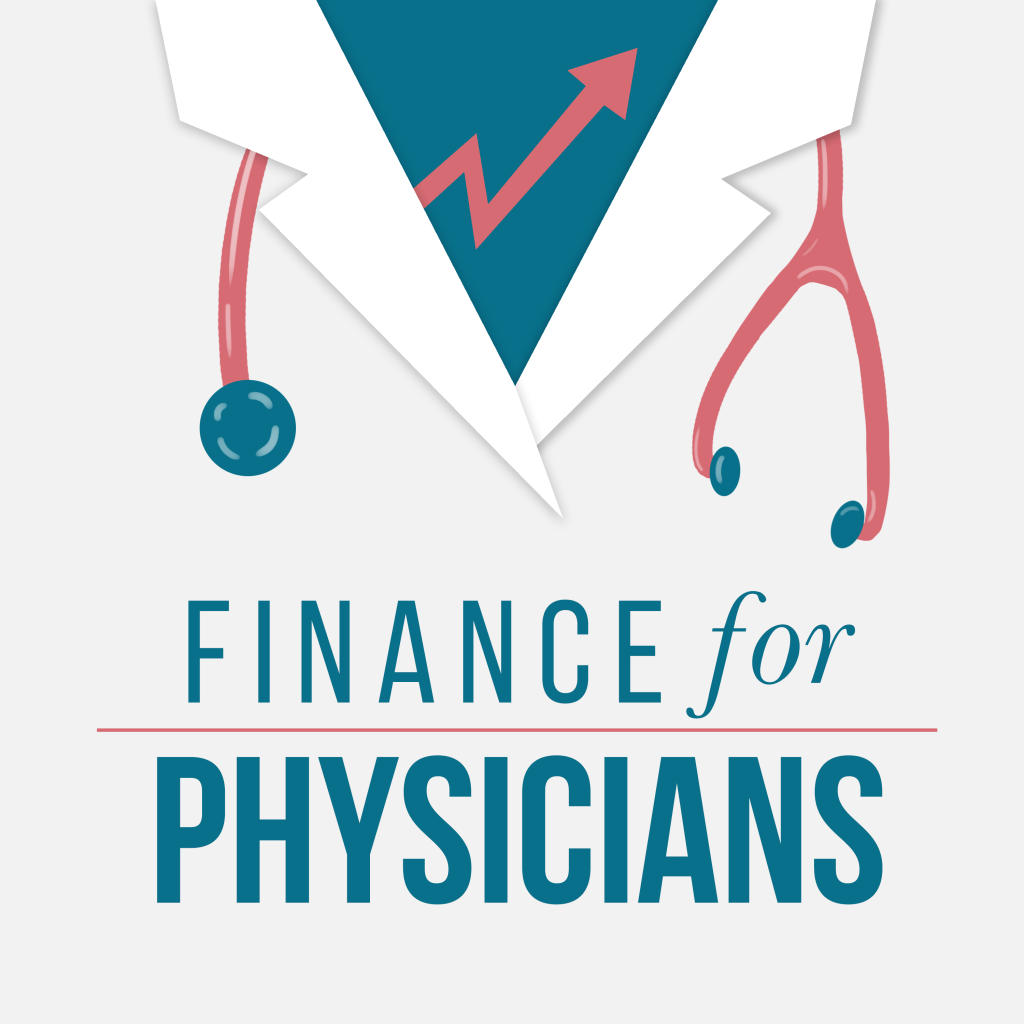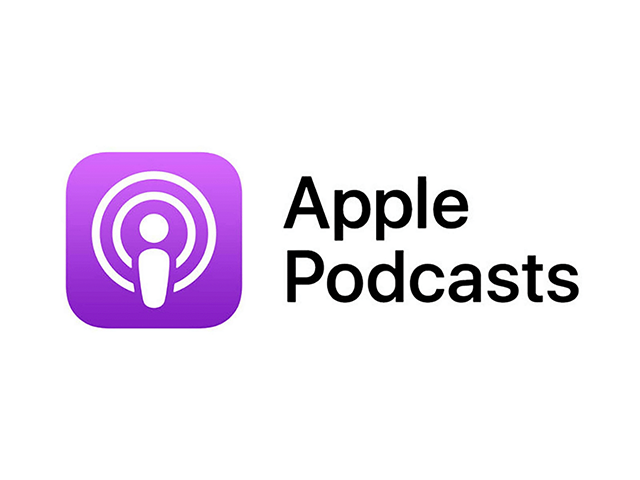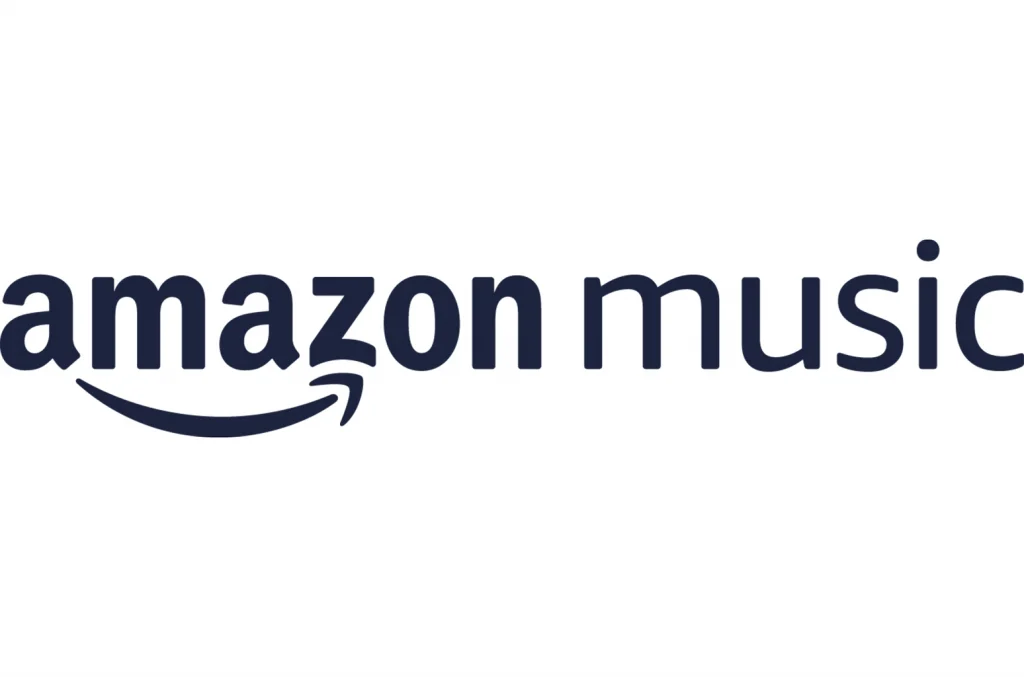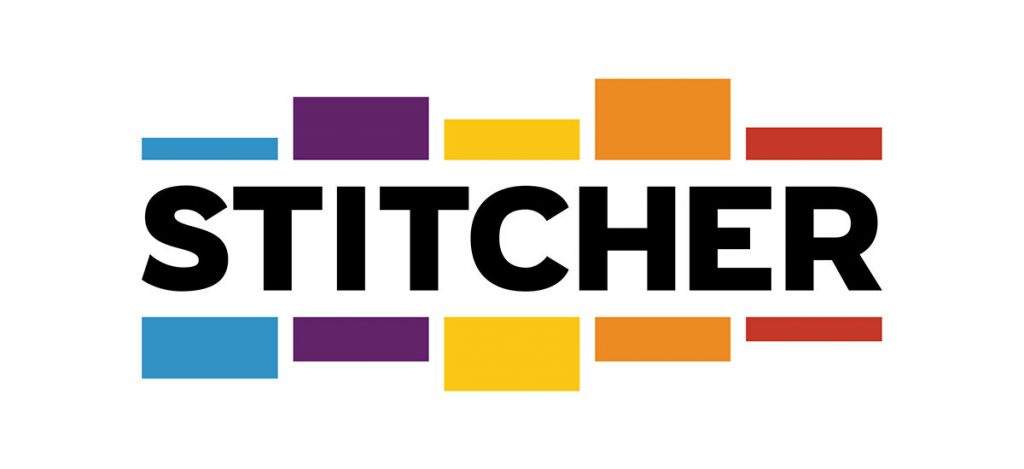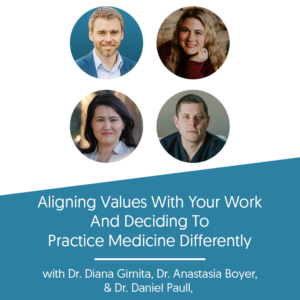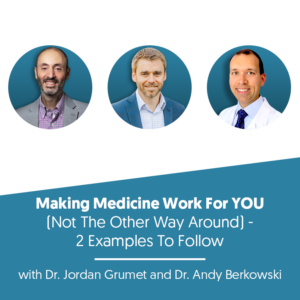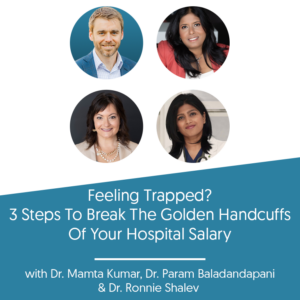The world of medicine has been highly popularized thanks to popular culture tv shows, books, movies etc. – But what’s even more incredible are the actual stories.
If you spend a few minutes browsing the web, you’ll find that more often than not reality is stranger than fiction.
Those are the types of stories we’re going to talk about on today’s episode of Finance for Physicians, with our special guest Kevin Pho, MD, host of The Podcast by KevinMD.
Kevin is a 20-year practicing internal medicine professional who also hosts one of the most popular newsletters in the physician world.
On today’s episode, we dive into a few interesting topics:
- Pull some interesting stories from Kevin’s Vault.
- Get deeper into finding out how Kevin’s MD brand grew so popular.
- Talk about inspiring physician finance stories.
- And much more!
If you enjoyed this episode, make sure to tune into our other interviews featuring our host, Daniel Wrenne of Wrenne Financial, and many more special guests!
Links:
Contact Finance for Physicians
Full Episode Transcript:
Daniel Wrenne: Kevin, thanks for joining me today. I’m glad to have you on the podcast.
Kevin Pho, MD: Thanks for having me.
Kevin Pho, MD: Yeah.
Daniel Wrenne: It should be a fun discussion. I know, Kevin, you have a lot of experience in having conversations with physicians. You’re a physician, trained yourself, and so there’s all sorts of things. I know I’m sure you’ve gathered from all those conversations and those experiences. And I look forward to our conversation today in regards to that.
Daniel Wrenne: But before we jump in, I was curious if you could kind of give us a little bit a background for those that aren’t familiar with you and what you’re doing. A little bit of background of like, where you started and how you’ve gotten to where you are today, doing what you’re doing?
Kevin Pho, MD: Sure. My name is Kevin Pho. I’m an internal medicine physician. I practice in Nashua, New Hampshire, which is a town 45 minutes north of Boston. And I do primary care, internal medicine, and I’ve been doing this for about 20 plus years at the same practice as a hospital and practice. I’m also the founder and editor of kevinmd.com, and it’s a platform where anyone across the healthcare spectrum can share their stories and amplify their voices, and there’s a lot of need for us to share our stories and what goes on behind the scenes of medicine.
Kevin Pho, MD: And we talk about things like clinician burnout. We talk about all the bureaucracy, electronic medical records and all the things that prevent us from giving the best care that we possibly could for patients. And like you, I have my own podcast, The Podcast by Kevin Md, where I have my guest authors come on a show and they share their own stories in their own words.
Kevin Pho, MD: So that dual role of me being a primary care physician, as well as being on social media and having my own site and being a platform where I can amplify voices. It’s given me kind of a unique perspective when it comes to practicing medicine here in the United States.
Daniel Wrenne: Yeah. And there are a lot of voices.
Daniel Wrenne: I’m excited to see more. It seems like physicians speaking up, there’s a lot more, opinions coming out and some of ’em bad things, some of ’em good things. I think the state of healthcare is in a little bit of a challenging spot right now. And there’s all sorts of views like emerging and people are trying to kind of come up with solutions and propose. Well, I guess really people are talking about the problem a lot now.
Daniel Wrenne: And I mean, there’s a few solutions coming up here and there, but I’m curious if maybe we could spend a little bit of time on that. I’m curious of your take, like given all the experiences you’ve had talking with different people and hearing these voices and opinions and that sort of thing, I’m curious of your opinion of like, the state of healthcare and physicians work in general. Like, where are we today in your view.
Kevin Pho, MD: Yeah. So many different directions I can go with that question. So let’s go with the clinician burnout. Right. So I think that even before the pandemic, the amount of clinicians who reported symptoms of burnout was about 50% to 60%. And I think that number is even higher now.
Kevin Pho, MD: And. , you know, you talk about things like physician shortages, especially in primary care, and if you have more of these doctors leaving the profession altogether, who’s gonna see more and more patients that need to be seen going forward? As it stands now, it takes like almost six months for a patient to come in to see me in my clinic and it’s very difficult to recruit primary care physicians to the Nashua, New Hampshire area.
Kevin Pho, MD: So that to me, I think is one of the biggest problems. And I think that one of the reasons why a lot of physicians are burnout out is really just kind of a lack of empowerment. A lack of autonomy. You know, you have a lot of doctors who train 10, 15 years, and do you think after they’re finished training, I have it made.
Kevin Pho, MD: You know, I practice medicine and my life will be all said. And that’s really far from the truth these days. There’s so many external pressures that prevent us from taking the best care that we possibly could to patients, and that’s leading to a lot of what we call moral injury. Things that are preventing us from practicing medicine the way we want to. And that’s causing a lot of frustration, burnout, and ultimately people leaving the profession.
Kevin Pho, MD: So I think that’s one of the more acute crises that’s facing the profession right now. How can we keep more of these physicians and clinicians in practice today? And what can we do about that?
Daniel Wrenne: Yeah. It’s scary to me, from my perspective, ‘cuz we work, we get to talk with a lot of physicians as well and work with some of them a little bit more closely. And it’s pretty alarming. Like the percentage of them that I know and we’re interacting with pretty young physicians.
Daniel Wrenne: The percentage of them that are very actively working to get out of medicine, is a little alarming, as a patient at least. It’s kind of crazy.
Daniel Wrenne: And so I, I’m not sure what the future looks like. But I’m really kind of like curious about like, I think there’s gotta be some solutions emerging.
Daniel Wrenne: And I kind of consider this as like an opportunity in some ways for maybe more of like the entrepreneurial physicians that have creative ideas. I think that’s like an entrepreneur’s dream in some ways. They have solutions to problems. That’s what entrepreneurship is. And it seems like there’s a little bit of a trend, or maybe not the right word, but a movement towards more physicians having a voice and then also coming up with solutions in entrepreneurship. But I’m curious your take on that.
Kevin Pho, MD: Yeah, I think you’re absolutely right. I think one of the emerging themes that I’m seeing on my site and of the doctors I interview is that physicians are more than our degrees. So gone are the days where we have our MD degrees and we just practice in a clinic or go to a hospital or do procedures or do surgeries, and that’s all we do.
Kevin Pho, MD: I think that the evolution of the MD Degree has been accelerating over the last few years and we talk to so many doctors who do more than just clinical care. They do, like you said, entrepreneurship. They do text startups, they do real estate, they do investing, and they do legal review and doesn’t name it.
Kevin Pho, MD: There are dozens and dozens of ways that we can leverage our MD degree outside of clinical care. And I think that by doing that, it takes a lot of the pressure off what we’re doing in clinical care. I think that is a potential solution to burnout because if we can rely less on what we do clinically, and that’s not to say that we wanna leave medicine altogether, but if we could have a hybrid where on one hand we can do clinical medicine, but on the other hand we can do things and explore our passions that fill our proverbial cup, so to speak, so we could continue to do clinical medicine longer.
Kevin Pho, MD: I think that’s going to really help with that burnout crisis. Now, that’s not to say that there are some physicians whose 100% passion is taking care of patients and more power to them. But I feel it for the majority of clinicians, that’s really not the case. And I think that we need to prevent these physicians from completely leaving the profession. And one way to do that is to feed that entrepreneurial spirit and we can talk about how we can do that later on so we could rely less on some of the clinical aspects of our profession that may be burning us out.
Daniel Wrenne: Yeah, I think entrepreneurship in some ways could be a way out of medicine, but it could also be a avenue to recreate the system of medicine. Because I mean, I personally think the system’s all jacked up. It’s got a lot of problems and it’s ripe for a new way of doing things. And so, it seems like entrepreneurship is a great example of like.. And physicians too are so smart, like they’re the smartest people I know and they have all these skills and expertise and what’s sad to me is when I see someone that has this expertise in these skills in an area and then they go do something completely different and not that that’s always a bad decision, but if they do enjoy it or could enjoy it in a different environment, it is a little bit sad to see that.
Daniel Wrenne: So what are some of the ways that physicians can really kind of lean to that.
Kevin Pho, MD: Yeah. So I think one of the reasons why that is, is that a lot of these other avenues outside of clinical isn’t really taught in medical school and residency. So as you’re training, you’re not necessarily exposed to some of the other things that you could do with your degree.
Kevin Pho, MD: And we mentioned things like entrepreneurship and that intersection between technology and medicine and working with perhaps health IT startups. So a lot of these alternative avenues of our degrees aren’t really explored just because we just don’t have a lot of exposure to them. So when we come out, we think that that’s all we have to do is that’s all we can do is really just see patients and do procedures and the like.
Kevin Pho, MD: So in terms of taking that next step, so how can we explore doing other things? I think first off, the number one is that you need to rely less on what I call your W2 Income. You need to rely less on clinical medicine as a source for your financial stability, because if you’re a slave to your job, then you have to keep on doing it.
Kevin Pho, MD: And no matter what the administration does to you as a physician, you have to take it because you have, of course, hundreds of thousands of dollars of loans to pay off. You have no other choice. So the faster you can divorce yourself from being reliant on your W2 income, the more that you can cut back on some of the things that may cause up dissatisfaction your professional life. Right? So that’s the number one thing.
Kevin Pho, MD: So I find and I’m sure that you find this too, that a lot of physicians, they’re not necessarily the best when it comes to managing money. They’re not necessarily the best when it comes to financial literacy and paying down debts. And a lot of doctors, as you know, live beyond their means.
Kevin Pho, MD: You know, they have to live that proverbial doctor lifestyle and buy that big house in a fancy car. And that’s the number one thing that physicians need to not do, is they have to live within their means. They need to pay off their debts as soon as possible so they can have those options to explore other avenues in case their clinical job is leading them to burnout.
Kevin Pho, MD: So once they do that, then I think there’s plenty of things that physicians can do in addition. You know, I think that if you look at what I do, that’s certainly one example. I see patients two, two and a half days a week in a internal medicine, primary care setting. I do love primary care and I feel that primary care physicians like myself, they’re needed. Like I said, there is an acute shortage of primary care physicians where I live. It takes months to see me. So I think that I am serving a need and I do love my patients. I’ve been seeing 20 years, I have several thousand patients, but I think if I did this five days a week, I think that’s gonna lead and accelerate my road to burnout as well.
Kevin Pho, MD: So I’m able to compliment what I do by working part-time. By doing podcast and doing what I do on Kevin MD. You know, I do speaking and these are things that are outside of clinical medicine that, again feeds that entrepreneur spirit and can help me keep on going when it comes to clinical medicine.
Kevin Pho, MD: Listening to a podcasts like this, there are plenty of podcasts that are out there by other entrepreneurial minded physicians who are financially independent. I’m sure that you’re familiar with the Fire Movement of Financial Independent, Retire Early Movement. There’s a whole movement of physicians who adopt that philosophy.
Kevin Pho, MD: They pay on their debt as soon as possible. So they are financially independent from medicine and they’re able to explore these other avenues. A very common one, for instance, is real estate ownership. You see a lot of physicians they own real estate. They manage properties, they manage portfolios of real estate, so that’s a very common one.
Kevin Pho, MD: I’ve talked to doctors who are, they help attorneys review cases, so it’s kind of nonclinical work as well. And that’s a great way to supplement their income. And it’s a nice hybrid to merge what physicians can do clinically, is of course expert witness work, content creation, like myself doing podcasts and a variety of other non-clinical jobs with industry, with the pharmaceutical industry, you could work as an advisor for tech startups.
Kevin Pho, MD: So I think the list is endless. I think that listening to shows, like this one, listen to my podcast, the podcast of Kevin MD. There are various Facebook groups that physicians can join that are physicians only, where doctors can talk about some of the ideas that they can do with their degrees. So I think once you’re financially independent from medicine, I think that there’s a whole new world that is out there that can keep doctors in medicine longer.
Daniel Wrenne: Yeah. When you start talking about entrepreneurship, it sky’s the limit. It’s like you got a clean slate. That can be intimidating, but it also is opportunity, eye-opening, you can kind of create your own path in some ways. But at the end of the day, it is a scary proposition. Like you mentioned, especially if you are not financially independent or you just have this fear of taking a big risk or making a change.
Daniel Wrenne: I think the scary factor is a big deal, and it’s scary to kind of go against the grain of what you’re told your entire training is what you should do. And then people look at you like, “Really you’re gonna do that?” Like, that’s not what people do. And that’s, kind of a big hurdle. That doesn’t mean I don’t think in any way that you shouldn’t do it necessarily.
Daniel Wrenne: That sometimes is a sign that maybe you should do it. But it is a scary thing. I’m curious, do you think you have to be, ‘cuz a lot of physicians struggle with that fear, especially early on with the dead and getting over that hurdle. Do you think you have to be financially independent to make the jump?
Kevin Pho, MD: Well, it certainly makes it much easier. Right? And I don’t think it has to be binary, right? It doesn’t have to be you’re in medicine or you’re outta medicine, right? There is certainly a spectrum and there’s a whole host of approaches one can take if you want to just cut back one day for instance.
Kevin Pho, MD: You can certainly do that. So it’s not a binary choice. And like I said, if you are financially, independent from medicine, it makes that choice much easier. One of the thing that you mentioned earlier is something I completely agree with in that there’s a very linear path when it comes for physicians. And like you said, we’re not exposed to a lot of the alternative things that we can do with our degrees here, medical school.
Kevin Pho, MD: So yeah, you’re right. When physicians say, “I’m just, you know, I’m gonna do this instead of medicine.” They’re going to get a lot of puzzled looks from their family members and their peers. So that’s why, it’s why I think it’s important to join communities of like-minded physicians who are talking about exactly the things that we’re talking about now that go to podcast.
Kevin Pho, MD: I know that, Nisha Mehta, she’s a radiologist and she runs a very popular physician side gigs Facebook group and it’s a physician only group that tens of thousands of physicians are there. And they precisely talk about the things that we’re talking here about other things that we can do with our degrees.
Kevin Pho, MD: So I think that the more that we talk about it, the more that we normalize it and make other doctors feel that there is a path outside of 100% clinical medicine the more it becomes accepted. And hopefully that’s going to lead to fewer physicians being burned out.
Daniel Wrenne: I think you have to be careful with social media. There’s a lot of distraction on social media, but in certain realms, or communities like LinkedIn, I am a little bit more of a fan of LinkedIn, professionally speaking. There’s a lot of like really solid physicians doing really creative things that are vocal on LinkedIn. And you can kind of start it once you tap into who those people are, it kind of opens up the universe and you realize there’s a ton of people doing cool things.
Daniel Wrenne: But yeah, the fear is a big deal and getting over that I think is a challenge, but it’s not insurmountable. I talked with Doc G. Do you know who Doc G is?
Kevin Pho, MD: Yeah, absolutely. Yeah.
Daniel Wrenne: And his whole thing, he worked in hospice for years and has experienced late life stage working with people. And one of the biggest things people regret is like not leaning into their fears. Which is interesting. Like oftentimes we get hung up by our fears and don’t take action.
Daniel Wrenne: But a lot of times that’s when you feel that fear, that’s like a sign that you really need to lean in. And kind of, you know, lean into that fear so you’re not gonna end up in a point in your life where you have regrets. On the other end of the spectrum, it’s all about, you know, in some cases it’s about like pride creeping in and ‘cuz you get these and everybody has this temptation to buy nice things and live into the lifestyle and you worked hard for it and I’ve worked really hard, I deserve to drive a nice car and that sort of thing.
Daniel Wrenne: But the problem with that is the more you build that up, like you mentioned, it kind of makes you a slave to your work. And that’s another kind of paralyzing position to be in. It’s a little different flavor, but it’s paralyzing if you’re basically completely job dependent. You have to work to support the lifestyle you’ve committed to. And it can feel paralyzing and almost probably worse than the fear thing. I think if you’re stuck, that’s a tough spot.
Daniel Wrenne: But it’s all a choice, right? I mean, you can make choices at any point in time to turn a direction and make a turn for the better and that sort of thing. But I mean, if you’re speaking to a younger physician that just feels the pressure of all this stuff. I can’t imagine what it’s like to be starting out in medicine. And I’m looking for jobs and I hear this negativity kind of with the profession and I’m like,
Daniel Wrenne: “Uh, how do I pick a job? Even like, where do I go from here?”
Daniel Wrenne: What piece of advice would you give to them?
Kevin Pho, MD: Yeah, so one thing is perspective. As physicians when you compare to other professions, we’re very lucky. Obviously we’ve all worked very hard, gone to medical school, did residency and all that.
Kevin Pho, MD: But when you compare ourselves to, say the tech industry. You know, you hear in the news that these giant tech companies are laying off tens of thousands of workers. As physicians, we need to realize that we are in a very privileged and blessed position. So, you know, when it comes to the job market, relative to other industries, I think that we do have options.
Kevin Pho, MD: So my piece of advice to young physicians is that we can create the professional life that we want with the MD degree we have, MD or DO degrees with a medical degree. We have the option and choices to create a life that we want. Don’t fall into the trap of that linear thinking is that you’ve done 10 years, 10 plus years of a certain thing and you have to do this as the next step. I think that that would be my biggest piece of advice. That we have options. You can create the life that you want, whether it’s blending clinical work with entrepreneur work, or blending clinical work with nonclinical work. Create the life that you want. Like I said, physicians are going to be in demand.
Kevin Pho, MD: There are physician shortages all across the nation, and you should be able to choose a job that fits what you want to do. And don’t fall prey in into doing something that you have to do.
Daniel Wrenne: Yeah. And ask the hard questions. Don’t let people tell you, “This is just the way it’s always been done. So you gotta do it this way.”
Daniel Wrenne: Push back on that kind of thing. That’s a big deal. Go with your gut too. I mean, a lot of people, your gut is like your instincts. You typically will lead you or point out like concerning things. You gotta kind of listen to that.
Kevin Pho, MD: Oh, one other thing I wanted to add is that you gotta find your tribe. Like I said, if we’re talking about physicians who are looking for things to do outside of clinical medicine or blending something outside of clinical medicine with clinical medicine, you’ve gotta find like-minded physicians, right? So if you’re, you know, in a tribe that only believes that you should be working 100 hours in a hospital and that doesn’t necessarily align with their values, then you’ve gotta find another tribe. And I can tell you right now there are tens of thousands of physicians who you know, I don’t wanna say side gigs, but they have achieved a hybrid model of what their professional career is. And I think that they are better off and happier because of it.
Daniel Wrenne: Yeah. I love the quote. I think it’s Jim Rohn, “You’re the average of your five best friends” and that’s completely true.
Daniel Wrenne: You gotta watch that too. Do you have any suggestions for like, how to get connected into new communities?
Kevin Pho, MD: Yeah, so I think, you mentioned one LinkedIn. LinkedIn certainly has a lot.
Kevin Pho, MD: I’m very active on LinkedIn as well. And there are a lot of like-minded clinicians who are there that blend that entrepreneur spirit with clinical medicine. I did mention Nisha Mehta and Facebook group, The Physician Side Gigs and physician community group there is our physician only. And again, a lot of like-minded clinicians that are there.
Kevin Pho, MD: If you look at Jim Dahle, White Coat Investor as well as, Physician On Fire and Passive Income, MD. These are all websites that you could start with. They all have podcasts. There’s a lot of content. But more importantly, it’s a community of like-minded physicians who are doing more with their MD degree.
Daniel Wrenne: Yeah. And if you find people that are, you resonate, a lot of it is value connection, if you can. You mentioned that already, if you can connect on values, like that’s a huge good starting point. And it might just be like buddies that you know, from training or whatever. If y’all like, think the same way about how the world should work, that’s always a great starting point and it doesn’t have to be formal community. It can be just like your circle of friends in a lot of cases. And that’s always a good starting point.
Daniel Wrenne: Well, as we wrap up, I wanted to know, I’m really curious about your thoughts on just cuz the future of medicine, I think there’s a lot of promising things that are happening and but I’m curious of your take on how do you envision the future of medicine? Like how are things gonna play out from here?
Kevin Pho, MD: So again, so many different directions in terms of how we could take this. The future of medicine. I think that despite everything that’s going on and all the obstacles that we face, I still think that medicine is a fantastic career choice, right?
Kevin Pho, MD: You, one of the biggest impacts you could possibly make on patients. You have patients who come to you at their most vulnerable time in their lives. You would ask them questions that no one else could ask these patients, and you examine patients and you could do.
Kevin Pho, MD: You know, if you think about some of the things that we do to patients, like, it is such a privilege being a physician. And there’s an incredible amount of trust that people place in a profession. So I do think that in terms of making the greatest impact on people and on society, medicine is still a wonderful profession. I think that we do need to guard against people leaving the profession.
Kevin Pho, MD: So hopefully, as we move forward, we can normalize that conversation where we can talk other things that physicians can do or degrees, and hopefully they can stay in clinical care. And I do think that we need more physicians going into some of the decision making roles, right? So one of the things that I advocate for on my website and on podcasts is that we need to share stories, right?
Kevin Pho, MD: We need to share what goes on behind the scenes, because if we don’t, then we risk other people making decisions on behalf of us. And these other people may not have physicians’ best interests at heart, right? It could be politicians and policy makers, and they’re not necessarily gonna look out for what’s best for physicians.
Kevin Pho, MD: So I think it’s important for physicians to be in those decision making roles. So overall, I think that medicine continues to be something that I’m very happy to be in. And it’s just given me so many opportunities to kind of explore outside of clinical medicine. And I encourage anyone listening to this podcast to kinda go beyond their degree and see where that takes them.
Kevin Pho, MD: Yeah. And Kevin’s a great example of someone that has identified a need and a problem and has kind created a new platform to kind of share solutions and you’re helping to be part of the solution just in what you do, which is fantastic to see. And so if you haven’t checked out Kevin’s stuff, he’s got all kinds of good stuff out there and his platforms of just examples and stories, you have a lot of great stories too that’s always encouraging to see or listen to or read through of other physicians or healthcare providers going through similar challenges we’re going through, but then they’re coming out with like these great solutions and there’s all kinds of ’em.
Kevin Pho, MD: You just kind of have to do a little bit of looking and like I said, Kevin’s site, if you haven’t checked it out, is a great resource for that.
Kevin Pho, MD: So I appreciate you coming on Kevin. It’s always fun to chat about stuff and it’s been a good conversation.
Daniel Wrenne: Thanks a lot Dan. Appreciate you having me on.


